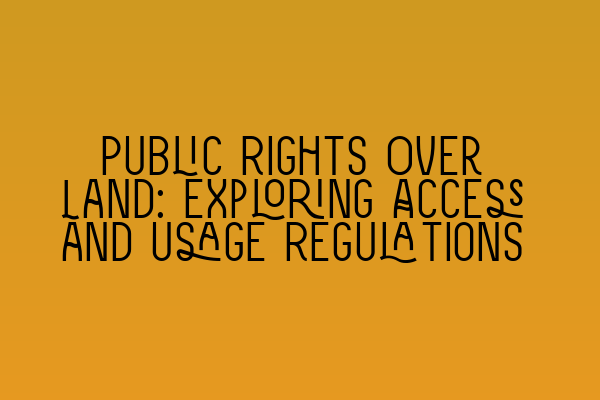Public Rights Over Land: Exploring Access and Usage Regulations
Welcome to SQE Property Law & Land Law, where we provide expert legal services in the field of property law. In this blog post, we will delve into the fascinating topic of public rights over land, specifically focusing on access and usage regulations. Understanding these regulations is crucial for landowners, tenants, and the general public alike. So, let’s dive right in!
What are Public Rights Over Land?
Public rights over land refer to the legal rights that the general public has to access and use certain areas of land. These rights are granted to the public either by legislation or long-standing custom. Examples of public rights over land include rights of way, public footpaths, bridleways, and open spaces.
It is essential to recognize that the public’s rights must be balanced with the rights of landowners. While individuals have the right to access and use certain areas of land, it must be done responsibly and without causing undue harm or interference.
Access Regulations: Know Your Rights
Access regulations are in place to govern the public’s rights over land and ensure that these rights are exercised responsibly. Let’s explore some key access regulations that you should be aware of:
Rights of Way
A right of way is a legal right that allows the public to pass over private land for a specific purpose, such as walking, cycling, or driving. These rights are typically established through a written agreement or by long-standing use.
Landowners must respect the rights of way on their properties and ensure that they are adequately maintained and accessible. In some cases, landowners may be able to apply for the diversion or extinguishment of a right of way, but this process can be complex and requires legal expertise.
Public Footpaths and Bridleways
Public footpaths and bridleways are another form of public rights over land. Footpaths are designated for pedestrians, while bridleways allow both pedestrians and horse riders. These rights are often accompanied by specific responsibilities, such as not causing damage to crops or livestock and keeping dogs on a leash.
The local government is responsible for maintaining public footpaths and bridleways and ensuring that they are safe and accessible for public use. Landowners should take care not to obstruct these paths or prevent public access.
For more information on contract law, check out our related articles:
- Interactive SQE Mock Tests for Contract Law: Test Your Knowledge
- Join Our SQE Contract Law Webinars: Expert Insights and Guidance
- Contract Law Reforms: An Analysis of Recent Changes
- Parties in a Contract: Rights and Responsibilities
- The Importance of Ethics in Contract Law: A Comprehensive Guide
Usage Regulations: Responsible Land Use
Usage regulations are designed to ensure that the public’s rights over land are exercised responsibly and without causing harm or nuisance to landowners, other users, or the environment. Let’s explore some key usage regulations:
Environmental Protection
Landowners have a duty to protect the environment on their land and prevent any harmful activities that could cause pollution or damage to natural habitats. The public must also respect the environment and avoid littering, damaging flora and fauna, or disrupting ecosystems.
Noise and Nuisance
While the public has the right to access and use certain areas of land, they must do so without causing excessive noise or nuisance to nearby landowners or residents. It is important to be mindful of noise levels, particularly in residential areas, and to avoid activities that may disrupt the peace and enjoyment of others.
Responsible Recreation
Public rights over land often provide opportunities for recreational activities such as walking, picnicking, and leisure pursuits. However, it is crucial to engage in these activities responsibly, respecting the land and any specific regulations or restrictions in place, such as no fires or camping in certain areas.
Conclusion
Public rights over land play a vital role in allowing the general public access to certain areas of land for various purposes. These rights come with corresponding access and usage regulations, ensuring that they are exercised responsibly and without causing harm or interference.
At SQE Property Law & Land Law, we understand the complexities of public rights over land and can provide expert legal advice and guidance to both landowners and the general public. If you have any questions or require assistance with any property law matters, please don’t hesitate to contact us.
